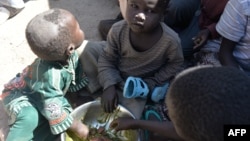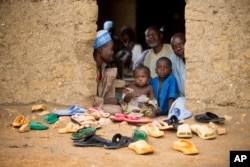The United Nations is helping Cameroon register thousands of births on its northern border with Nigeria that have gone unreported over the past four years amid the Boko Haram conflict. The first phase of the initiative has just wrapped up in Maroua, the capital of the Far North region.
Hundreds of school children cue up at the Government High School in Mozogo in northern Cameroon to receive their birth certificates.
Among them is 13-year-old Mohamadou Dani who was sent home from the entrance exam for secondary school last year because he had no record of his existence.
He says he is thankful as he can now go to school without fear because he has a birth certificate and books.
Cameroon’s government estimates that 30 percent of children nationwide lack birth certificates, but the situation is particularly bad in the north near the border with Nigeria. There, as many as 80 percent of children lack birth certificates.
It is not uncommon for parents to wait until a child is preparing to start school to obtain a birth certificate, but mass displacement due to the Boko Haram conflict has complicated matters.
The government estimates that less than five percent of births in the region have been registered since 2013 as both families and officials fled atrocities.
Cameroon’s minister of public service, Michel Ange Angouing, says birth certificates are important to individuals and the state, which needs an accounting of its citizens. He says he is urging all birth registration officials who have been absent to return to work immediately.
A regional military offensive begun in 2015 has weakened Boko Haram, retaking much of the territory the militants once occupied.
UN partnership
Over the past two months, Cameroon's government has partnered with the U.N. to issue 17,000 birth certificates in the Far North region.
Allegra Baiocchi, the UN resident coordinator in Cameroon, says a birth certificate is a fundamental human right.
"Birth certificates allow you to go to school, allows you to move, allows you to eventually one day get a job, allows you to vote. So it is a fundamental piece of paper for everyone," said Baiocchi.
As the exercise continues, local school authorities have also been instructed to admit all children, giving the parents until the first official exam to provide the birth certificates.
However other challenges remain.
A difficult task
Birth registration centers are very far from some of the villages. As many as 70 percent of babies in the region are delivered at home by traditional health attendants so their mothers lack conventional medical records. And given the mass influx of Nigerian refugees, it can be difficult to establish the parents’ nationalities.
Communities on both sides of the border with Nigeria speak the same languages, like Kanuri and Hausa, and some mothers are afraid that they may be sent back to Nigeria if they disclose their nationality.
In 2015, the government of Cameroon and the U.N. Refugee Agency began issuing Nigerian children's birth certificates with the hope their government will accept them when the refugees return.










